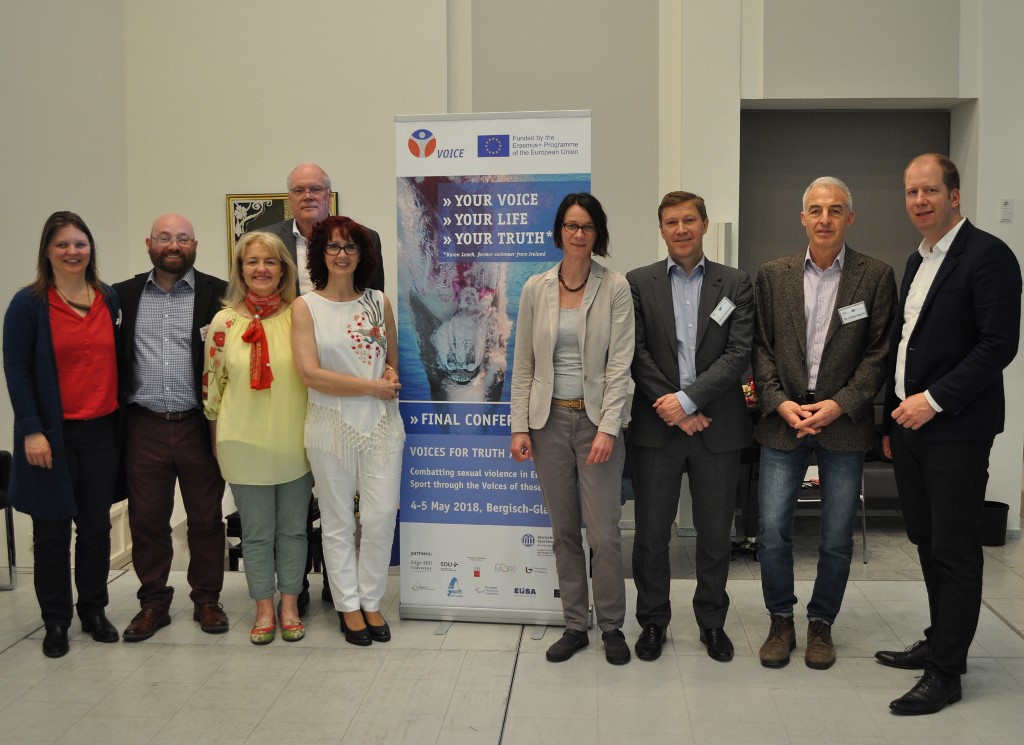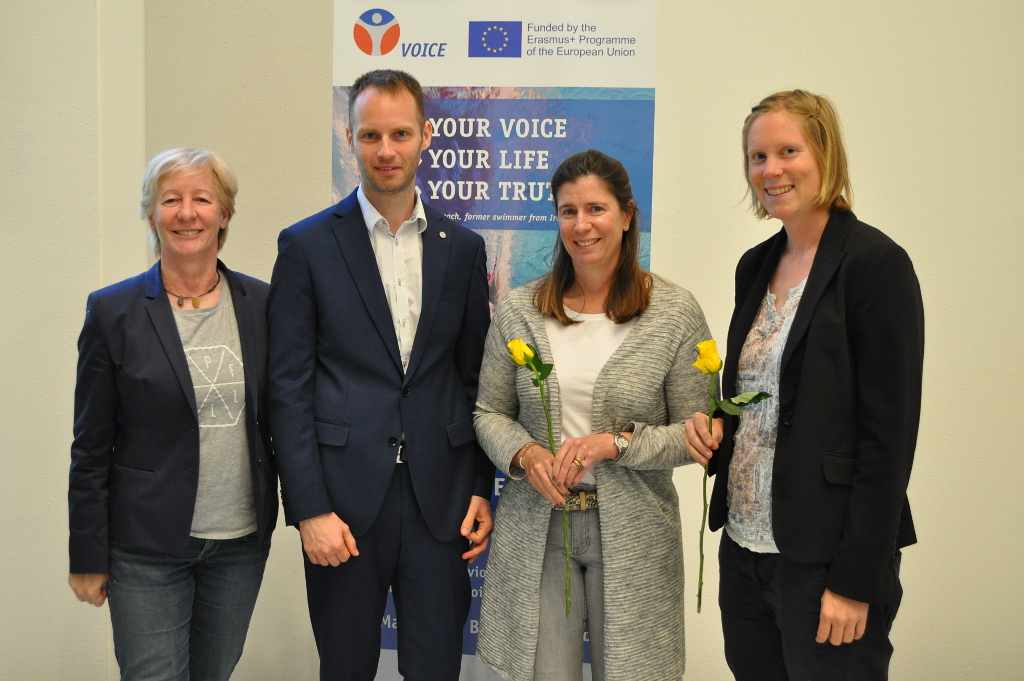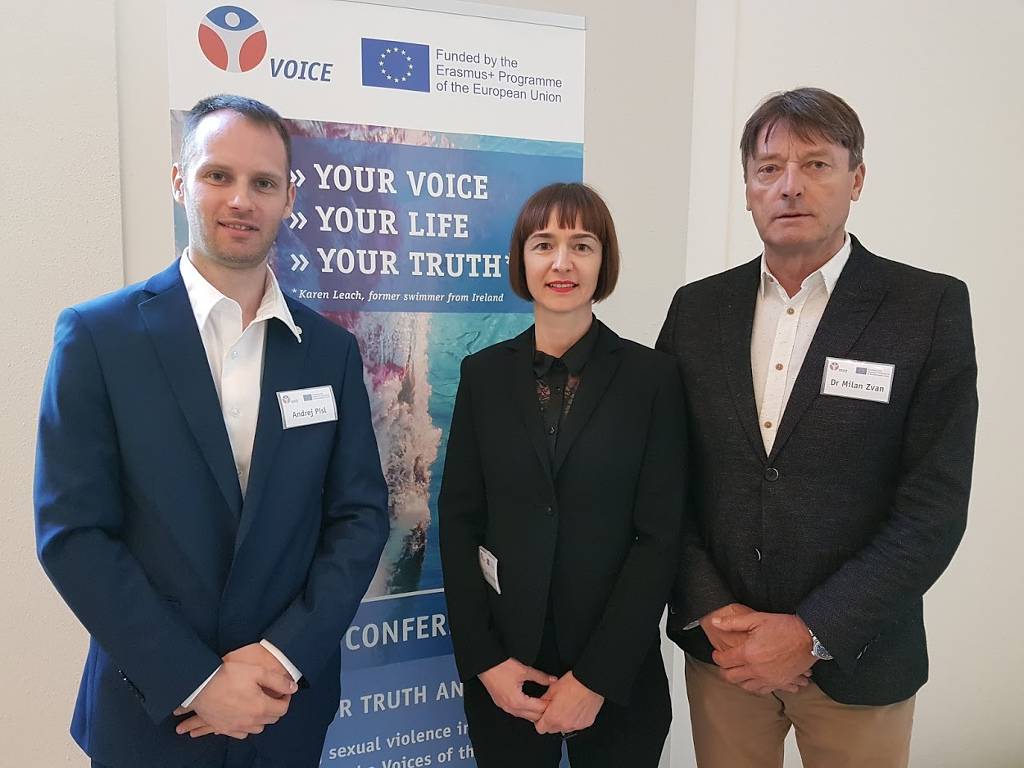Final Conference of the VOICE project

"Your voice - your life - your truth" – the message of former Irish swimmer Ms Karen Leach, was the title of the final conference of the project VOICE, held in Bergisch Gladbach near Cologne on May 4-5, 2018. The EU-funded project Voices for truth and dignity (VOICE) is lead by the German Sport University Cologne and pursues the goal of scientifically investigating sexual violence in sport.
The focus is on the reports and experiences of those affected. 135 people from 16 European countries participated in the conference to learn from the reports of those affected how sexualized violence develops in sport, what support they need and how protective measures should be designed. At the center of the project is an interview study with people affected by sexual violence in sport, which was conducted in seven European countries. In detailed interviews, a total of 72 people have reported their experiences of violence in sport. The present study is the most extensive of its kind so far. Seven researchers from universities in Europe were involved in the conduct and analysis of the interviews. Central findings were presented at the final conference by Ms Bettina Rulofs (German Sport University Cologne, GER) and Ms Mike Hartill (Edge Hill University, GBR).
Around 70% of those who took part in the interviews are female, 30% male. The offenders are almost exclusively male and in 90% of the investigated cases they are coaches or responsible persons in sport. The cases come from a variety of sports and contexts, most often from football, accounting for one-fifth of the total. This is due to the high popularity of the sport and the high number of members. "The conditions for sexual assault are less anchored in individual sports", says Ms Rulofs, "but rather in general characteristics of sport and the culture of some sports clubs and federations."
The reports of those affected show that their sporting environment was characterized by a high degree of dependency, trust, high selection pressure and a strict disciplinary treatment of the body. Under these conditions sexualized attacks in sport are sometimes hidden for years. Just under 40% of those involved in the study reported to official agencies in and out of the sport in order to receive help. Sobering is the conclusion that some sufferers never received this help, but the sports clubs or associations continue to conceal the deeds in order not to harm their reputation. "What hurts deeply, is the silence of the authorities after you report your experience", says Mr Colin Harris, former UK footballer, who participates in the VOICE project.
A central postulation of the project is therefore that sport organizations investigate cases of sexual violence in a differentiated way and proactively involve those affected as well. Ms Gloria Viseras, a member of the steering committee of the project and former Spanish Olympian in gymnastics concluded: "Participating in the VOICE project has helped us to understand how strong our voices are and how much we survivors can help sport to fight sexual violence." In total, 24 people affected by sexual violence in sport took part in the conference in order to raise their voice for safe sport in Europe and to actively participate in prevention work, including the Austrian Nicola Werdenigg, who had recently shared publicly her experiences of violence in the ski sport and is committed to fight the abuse of power in sports. "Sports organizations need to listen to the victims of sexual violence and then actively involve them in work to prevent violence," concluded Ms Susan Greinig, Medical Programmes Senior Manager at the International Olympic Committee (IOC), during the final panel discussion with the sports stakeholders.
EU funding within Erasmus+ Sport Programme for the VOICE project concludes at the end of June 2018. The participating seven countries – Austria, Belgium, Denmark, Germany, Slovenia, Spain and United Kingdom – are now looking for ways to continue the work with survivors and to learn from their experiences. Universities, as well as sports and victim protection organizations, work together in all participating countries, and are supported by four European sports bodies who will focus on dissemination of the project results.
The main partners of the project are the German Sport University (GER), Edge Hill University (GBR), University of Ljubljana (SLO), University of Southern Denmark (DEN), University of Vienna (AUT), University of Antwerp & Thomas More University College (BEL), University of Vic - University Central of Catalunya (ESP), NWG Network (GBR), European University Sports Association (EUSA), European Paralympic Committee (EPC), Youth Section of the European Non-Governmental Sports Organisation (ENGSO Youth) and the European Gay & Lesbian Sport Federation (EGLSF).
European University Sports Association (EUSA) was represented at the Conference by EUSA Executive Committee member and Chair of the Education Commission Mr Milan Zvan, Education and Development Manager Ms Sara Rozman and Communications and Projects Manager Mr Andrej Pisl, who is also the responsible person for the project within EUSA.
Education material and additional resources will be available in June on the official website www.voicesfortruthanddignity.eu.
